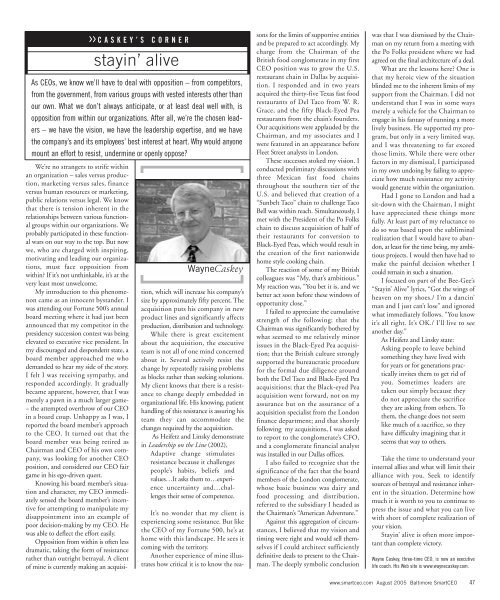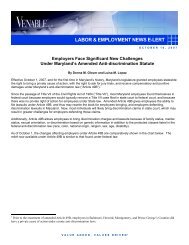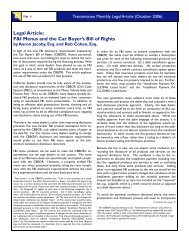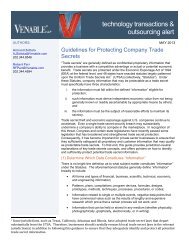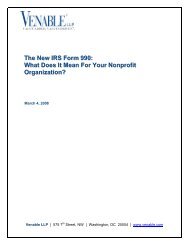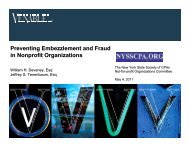By-Passing the Jury Through Mediation or Arbitration - Venable LLP
By-Passing the Jury Through Mediation or Arbitration - Venable LLP
By-Passing the Jury Through Mediation or Arbitration - Venable LLP
Create successful ePaper yourself
Turn your PDF publications into a flip-book with our unique Google optimized e-Paper software.
CASKEY’S CORNER<br />
stayin’ alive<br />
As CEOs, we know we’ll have to deal with opposition – from competit<strong>or</strong>s,<br />
from <strong>the</strong> government, from various groups with vested interests o<strong>the</strong>r than<br />
our own. What we don’t always anticipate, <strong>or</strong> at least deal well with, is<br />
opposition from within our <strong>or</strong>ganizations. After all, we’re <strong>the</strong> chosen leaders<br />
– we have <strong>the</strong> vision, we have <strong>the</strong> leadership expertise, and we have<br />
<strong>the</strong> company’s and its employees’ best interest at heart. Why would anyone<br />
mount an eff<strong>or</strong>t to resist, undermine <strong>or</strong> openly oppose?<br />
WayneCaskey<br />
We’re no strangers to strife within<br />
an <strong>or</strong>ganization – sales versus production,<br />
marketing versus sales, finance<br />
versus human resources <strong>or</strong> marketing,<br />
public relations versus legal. We know<br />
that <strong>the</strong>re is tension inherent in <strong>the</strong><br />
relationships between various functional<br />
groups within our <strong>or</strong>ganizations. We<br />
probably participated in <strong>the</strong>se functional<br />
wars on our way to <strong>the</strong> top. But now<br />
we, who are charged with inspiring,<br />
motivating and leading our <strong>or</strong>ganizations,<br />
must face opposition from<br />
within? If it’s not unthinkable, it’s at <strong>the</strong><br />
very least most unwelcome.<br />
My introduction to this phenomenon<br />
came as an innocent bystander. I<br />
was attending our F<strong>or</strong>tune 500’s annual<br />
board meeting where it had just been<br />
announced that my competit<strong>or</strong> in <strong>the</strong><br />
presidency succession contest was being<br />
elevated to executive vice president. In<br />
my discouraged and despondent state, a<br />
board member approached me who<br />
demanded to hear my side of <strong>the</strong> st<strong>or</strong>y.<br />
I felt I was receiving sympathy, and<br />
responded acc<strong>or</strong>dingly. It gradually<br />
became apparent, however, that I was<br />
merely a pawn in a much larger game-<br />
– <strong>the</strong> attempted overthrow of our CEO<br />
in a board coup. Unhappy as I was, I<br />
rep<strong>or</strong>ted <strong>the</strong> board member’s approach<br />
to <strong>the</strong> CEO. It turned out that <strong>the</strong><br />
board member was being retired as<br />
Chairman and CEO of his own company,<br />
was looking f<strong>or</strong> ano<strong>the</strong>r CEO<br />
position, and considered our CEO fair<br />
game in his ego-driven quest.<br />
Knowing his board member’s situation<br />
and character, my CEO immediately<br />
sensed <strong>the</strong> board member’s incentive<br />
f<strong>or</strong> attempting to manipulate my<br />
disappointment into an example of<br />
po<strong>or</strong> decision-making by my CEO. He<br />
was able to deflect <strong>the</strong> eff<strong>or</strong>t easily.<br />
Opposition from within is often less<br />
dramatic, taking <strong>the</strong> f<strong>or</strong>m of resistance<br />
ra<strong>the</strong>r than outright betrayal. A client<br />
of mine is currently making an acquisition,<br />
which will increase his company’s<br />
size by approximately fifty percent. The<br />
acquisition puts his company in new<br />
product lines and significantly affects<br />
production, distribution and technology.<br />
While <strong>the</strong>re is great excitement<br />
about <strong>the</strong> acquisition, <strong>the</strong> executive<br />
team is not all of one mind concerned<br />
about it. Several actively resist <strong>the</strong><br />
change by repeatedly raising problems<br />
as blocks ra<strong>the</strong>r than seeking solutions.<br />
My client knows that <strong>the</strong>re is a resistance<br />
to change deeply embedded in<br />
<strong>or</strong>ganizational life. His knowing, patient<br />
handling of this resistance is assuring his<br />
team <strong>the</strong>y can accommodate <strong>the</strong><br />
changes required by <strong>the</strong> acquisition.<br />
As Heifetz and Linsky demonstrate<br />
in Leadership on <strong>the</strong> Line (2002),<br />
Adaptive change stimulates<br />
resistance because it challenges<br />
people’s habits, beliefs and<br />
values…It asks <strong>the</strong>m to…experience<br />
uncertainty and…challenges<br />
<strong>the</strong>ir sense of competence.<br />
It’s no wonder that my client is<br />
experiencing some resistance. But like<br />
<strong>the</strong> CEO of my F<strong>or</strong>tune 500, he’s at<br />
home with this landscape. He sees it<br />
coming with <strong>the</strong> territ<strong>or</strong>y.<br />
Ano<strong>the</strong>r experience of mine illustrates<br />
how critical it is to know <strong>the</strong> reasons<br />
f<strong>or</strong> <strong>the</strong> limits of supp<strong>or</strong>tive entities<br />
and be prepared to act acc<strong>or</strong>dingly. My<br />
charge from <strong>the</strong> Chairman of <strong>the</strong><br />
British food conglomerate in my first<br />
CEO position was to grow <strong>the</strong> U.S.<br />
restaurant chain in Dallas by acquisition.<br />
I responded and in two years<br />
acquired <strong>the</strong> thirty-five Texas fast food<br />
restaurants of Del Taco from W. R.<br />
Grace, and <strong>the</strong> fifty Black-Eyed Pea<br />
restaurants from <strong>the</strong> chain’s founders.<br />
Our acquisitions were applauded by <strong>the</strong><br />
Chairman, and my associates and I<br />
were featured in an appearance bef<strong>or</strong>e<br />
Fleet Street analysts in London.<br />
These successes stoked my vision. I<br />
conducted preliminary discussions with<br />
three Mexican fast food chains<br />
throughout <strong>the</strong> sou<strong>the</strong>rn tier of <strong>the</strong><br />
U.S. and believed that creation of a<br />
“Sunbelt Taco” chain to challenge Taco<br />
Bell was within reach. Simultaneously, I<br />
met with <strong>the</strong> President of <strong>the</strong> Po Folks<br />
chain to discuss acquisition of half of<br />
<strong>the</strong>ir restaurants f<strong>or</strong> conversion to<br />
Black-Eyed Peas, which would result in<br />
<strong>the</strong> creation of <strong>the</strong> first nationwide<br />
home style cooking chain.<br />
The reaction of some of my British<br />
colleagues was “My, that’s ambitious.”<br />
My reaction was, “You bet it is, and we<br />
better act soon bef<strong>or</strong>e <strong>the</strong>se windows of<br />
opp<strong>or</strong>tunity close.”<br />
I failed to appreciate <strong>the</strong> cumulative<br />
strength of <strong>the</strong> following: that <strong>the</strong><br />
Chairman was significantly bo<strong>the</strong>red by<br />
what seemed to me relatively min<strong>or</strong><br />
issues in <strong>the</strong> Black-Eyed Pea acquisition;<br />
that <strong>the</strong> British culture strongly<br />
supp<strong>or</strong>ted <strong>the</strong> bureaucratic procedure<br />
f<strong>or</strong> <strong>the</strong> f<strong>or</strong>mal due diligence around<br />
both <strong>the</strong> Del Taco and Black-Eyed Pea<br />
acquisitions; that <strong>the</strong> Black-eyed Pea<br />
acquisition went f<strong>or</strong>ward, not on my<br />
assurance but on <strong>the</strong> assurance of a<br />
acquisition specialist from <strong>the</strong> London<br />
finance department; and that sh<strong>or</strong>tly<br />
following my acquisitions, I was asked<br />
to rep<strong>or</strong>t to <strong>the</strong> conglomerate’s CFO,<br />
and a conglomerate financial analyst<br />
was installed in our Dallas offices.<br />
I also failed to recognize that <strong>the</strong><br />
significance of <strong>the</strong> fact that <strong>the</strong> board<br />
members of <strong>the</strong> London conglomerate,<br />
whose basic business was dairy and<br />
food processing and distribution,<br />
referred to <strong>the</strong> subsidiary I headed as<br />
<strong>the</strong> Chairman’s “American Adventure.”<br />
Against this aggregation of circumstances,<br />
I believed that my vision and<br />
timing were right and would sell <strong>the</strong>mselves<br />
if I could architect sufficiently<br />
definitive deals to present to <strong>the</strong> Chairman.<br />
The deeply symbolic conclusion<br />
was that I was dismissed by <strong>the</strong> Chairman<br />
on my return from a meeting with<br />
<strong>the</strong> Po Folks president where we had<br />
agreed on <strong>the</strong> final architecture of a deal.<br />
What are <strong>the</strong> lessons here? One is<br />
that my heroic view of <strong>the</strong> situation<br />
blinded me to <strong>the</strong> inherent limits of my<br />
supp<strong>or</strong>t from <strong>the</strong> Chairman. I did not<br />
understand that I was in some ways<br />
merely a vehicle f<strong>or</strong> <strong>the</strong> Chairman to<br />
engage in his fantasy of running a m<strong>or</strong>e<br />
lively business. He supp<strong>or</strong>ted my program,<br />
but only in a very limited way,<br />
and I was threatening to far exceed<br />
those limits. While <strong>the</strong>re were o<strong>the</strong>r<br />
fact<strong>or</strong>s in my dismissal, I participated<br />
in my own undoing by failing to appreciate<br />
how much resistance my activity<br />
would generate within <strong>the</strong> <strong>or</strong>ganization.<br />
Had I gone to London and had a<br />
sit-down with <strong>the</strong> Chairman, I might<br />
have appreciated <strong>the</strong>se things m<strong>or</strong>e<br />
fully. At least part of my reluctance to<br />
do so was based upon <strong>the</strong> subliminal<br />
realization that I would have to abandon,<br />
at least f<strong>or</strong> <strong>the</strong> time being, my ambitious<br />
projects. I would <strong>the</strong>n have had to<br />
make <strong>the</strong> painful decision whe<strong>the</strong>r I<br />
could remain in such a situation.<br />
I focused on part of <strong>the</strong> Bee-Gee’s<br />
“Stayin’ Alive” lyrics, “Got <strong>the</strong> wings of<br />
heaven on my shoes./ I’m a dancin’<br />
man and I just can’t lose” and ign<strong>or</strong>ed<br />
what immediately follows. “You know<br />
it’s all right. It’s OK./ I’ll live to see<br />
ano<strong>the</strong>r day.”<br />
As Heifetz and Linsky state:<br />
Asking people to leave behind<br />
something <strong>the</strong>y have lived with<br />
f<strong>or</strong> years <strong>or</strong> f<strong>or</strong> generations practically<br />
invites <strong>the</strong>m to get rid of<br />
you. Sometimes leaders are<br />
taken out simply because <strong>the</strong>y<br />
do not appreciate <strong>the</strong> sacrifice<br />
<strong>the</strong>y are asking from o<strong>the</strong>rs. To<br />
<strong>the</strong>m, <strong>the</strong> change does not seem<br />
like much of a sacrifice, so <strong>the</strong>y<br />
have difficulty imagining that it<br />
seems that way to o<strong>the</strong>rs.<br />
Take <strong>the</strong> time to understand your<br />
internal allies and what will limit <strong>the</strong>ir<br />
alliance with you. Seek to identify<br />
sources of betrayal and resistance inherent<br />
in <strong>the</strong> situation. Determine how<br />
much it is w<strong>or</strong>th to you to continue to<br />
press <strong>the</strong> issue and what you can live<br />
with sh<strong>or</strong>t of complete realization of<br />
your vision.<br />
Stayin’ alive is often m<strong>or</strong>e imp<strong>or</strong>tant<br />
than complete vict<strong>or</strong>y.<br />
Wayne Caskey, three-time CEO, is now an executive<br />
life coach. His Web site is www.waynecaskey.com.<br />
www.smartceo.com August 2005 Baltim<strong>or</strong>e SmartCEO 47


